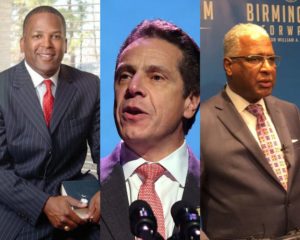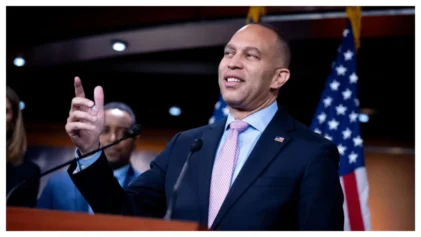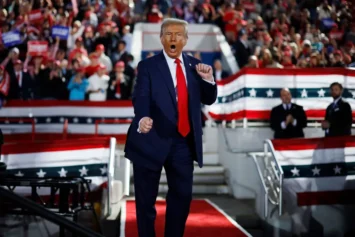
Mayor Steve Benjamin of Columbia, S.C., Governor Andrew Cuomo of NY., Mayor William Bell, Birmingham, Al
The running joke is that there’s a Trump tweet for everything. From criticism of President Obama’s golf outings — which he’s already outpaced — to climate change, an issue he once tweeted was “Created by and for the Chinese in order to make U.S. manufacturing non-competitive.”
While campaigning, he insisted, “Obama’s talking about all of this with the global warming — a lot of it’s a hoax. It’s a hoax. I mean it’s a money-making industry, OK? It’s a hoax, a lot of it.” But when pressed about his views, he distanced himself from earlier comments, claiming, “I did not. I did not. I did not say that” during the first presidential debate. (He did.)
As president, he’s now free to transform those views into national policy, though White House Press Secretary Sean Spicer recently admitted he’s unsure of whether Trump actually believes in climate change or not. During a press conference last week, Spicer said, “Honestly, I haven’t asked him.” Adding, “I can get back to you.”
Whether he believes his own words or not, Trump has pursued an anti-scientific agenda since taking office, which culminated last week when he announced that the United States will pull out of the Paris Agreement. Crafted during Obama’s tenure, the treaty was adopted in 2015, a year NASA recorded as the warmest in modern record-keeping history.
Also known as the Paris Climate Accord, nearly 200 nations came together in an effort to curb carbon emissions, with the U.S. volunteering to reduce its own emission rates by 26 to 28 percent by 2025. By leaving a vacant seat at the table, the White House has further isolated the U.S. from the rest of the international community, leaving other nations, namely China, poised to fill the void.
Immediately after Trump’s decision to withdraw, California climate scientist Benjamin Santer warned, “Today, the United States pulled out of the Paris climate agreement and missed the rising tide. Far from ‘Making America Great Again,’ this decision condemns the United States to becoming one of the ‘has-beens’ of history. We will become increasingly irrelevant to the rest of the world. They are going forward; we are going backward.”
According to Oliver Geden, a visiting research fellow at the Institute for Science, Innovation and Society, “The United States gave up climate leadership already at the day of Trump’s inauguration. In March, Trump announced his rollback of Obama-era climate regulations. So, it’s been clear for some time that the U.S. federal government is not going to act on climate change in the foreseeable future. Withdrawing from the Paris agreement is just another step, although a highly symbolic one.”
Others have rejected Trump’s climate denial rhetoric, the governors of California, New York, Washington and others working across party lines to develop the United States Climate Alliance. Designed to uphold the treaty, the group reiterated its pledge to continue “taking aggressive action on climate change.”
A number of U.S. mayors have vowed to do the same, proving that local leadership can have an impact even in the face of federal opposition. After Trump asserted he withdrew because he “was elected to represent the citizens of Pittsburgh, not Paris,” Pittsburgh Mayor Bill Peduto responded via a written statement.
“[Trump’s] misguided decision to withdraw from the Paris climate does not reflect the values of our city,” Perduto said. “Cities can help lead the transition away from dirty fuels to renewable energy, but it will require boldness and ambition to get it done.
“I’m proud to stand with my fellow mayors to call for a transition to 100 percent clean and renewable energy in my community.”
In the absence of dedicated federal funding, former New York City Mayor Michael Bloomberg has promised $15 million to the U.N., explaining, “The fact of the matter is, Americans don’t need Washington to meet our Paris commitment, and Americans are not going to let Washington stand in the way of fulfilling it.”
Thankfully, they’re not alone, with hundreds of companies including Amazon, Adidas, Microsoft and more banding together to form the “We Are Still In” campaign in an effort to adhere to the Paris Accord.
“In the absence of leadership from Washington, states, cities, colleges and universities, and businesses representing a sizable percentage of the U.S. economy will pursue ambitious climate goals, working together to take forceful action and to ensure that the U.S. remains a global leader in reducing emissions” the campaign via a press release read.
Voicing her frustration with the current state of affairs, Katharine Hayhoe, director of the Climate Science Center at Texas Tech University, said, “The biggest loser from the decision could be the United States itself. Why? Because while the Paris agreement is a climate treaty, a triumph for evidence-based decision-making, it’s also much more: a trade agreement, an investment blueprint and a strong incentive for innovation in the energy and the economy of the future.
“India broke its own record for the lowest bids for electricity from solar power,” she continued. “Last month, Ernst & Young listed its most attractive markets for renewables: the United States came third, behind China and India. And earlier this year, China announced a $360-billion investment in clean energy to create 13 million new jobs.
“The U.S. announcement shows that it will be doing its best to turn back the clock, while the rest of the world accelerates into the future.”
Losing its role as a global leader is now a legitimate cause of concern, with international leaders forming new partnerships as the White House leans back. As local governments continue to step up their own efforts, California Gov. Jerry Brown met with Chinese President XI Jinping on Tuesday to address climate control.
Speaking positively about the encounter, Brown said, “It’s highly significant that the governor of California can meet with the president of China and talk about the foremost issue of our time.
“It’s very clear he welcomes an increased role on the part of California.”
China rivals the U.S. in emission rates, but it also has invested heavily in renewable energy, making it a potential partner for a number of American tech companies.
“They’ve realized that climate change is not just a burden, it can be turned into an opportunity,” climate change expert and Hong Kong University professor Xu Yuan said.
Cecilia Smith is a Houston based journalist with a passion for politics, music, social commentary and films. A California native, she’s written for Houston Style Magazine, Houston Press, AllHipHop.com, SwaysUniverse.com and more. She holds a degree in Print Journalism from the University of Houston, and loves all things related to Star Wars. Follow her @SimplyCecilia.


